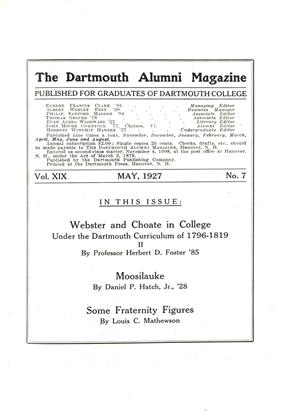The interest of educators generally may well be attracted to an experiment, which has a novel but by no means unpromising look, which is being made at Rollins College in Florida under the leadership of its new president, Dr. Hamilton Holt, involving what has been described as "an Emersonian professorship of Books." To this work it is understood a Dartmouth alumnus, Edwin Osgood Grover '94, has been summoned.
The idea, according to such announce ments as have been seen, is to stimulate interest in literary efforts by a series of courses relating to books, which will differ from the stereotyped theories of "English" teaching, including courses in the history and practice of book-making, in literary personalities, and such guidance as may lead to the eager reading of good books on the part of students who will read such works because their inclination leads them to do so, and not because they are set as required tasks. Dr. Johnson, that embodiment of common sense, sagely observed that what a man reads as a task will do him little good.
One awaits with some interest to discover what the actual working of such a project will prove to be, not hoping too much of it and making due allowance for the wandering attentions and enthusiasms of youth, but cordially admitting that there is great need of something like this to awaken an interest which most of us are aroused to only when it is too late to enable us to give it full satisfaction. In one's college years there is a better opportunity to read for pleasure than one is likely to have afterwards, the books are more easily accessible, and guidance is always at hand. Yet most of us do not read as much as we should in our younger years, and it is probable that it is because the desire is dormant for lack of stimulus.
Mr. Grover, who was of a literary turn of mind when in college and whose career since graduation has brought him into intimate contact with publishing, has evidently been developing a theory as to instruction which sorts well with the ideas of Dr. Holt, to which further allurement is added by the statement that much of this novel course will be conducted in the open air—rather in the Athenian manner. That is possible in Florida. But the great attraction of the idea lies in its intent to awaken early in the mind of the student that appreciation of literary works, which otherwise will burgeon only in maturer and less leisured years, by revealing the magic of good reading and the fascination that lurks in the printed page.
It has been remarked more than once in these pages that the real secret of the good teacher resides in his power to make his students eagerly interested to learn, rather than to erect barriers of boredom. President Holt aptly remarks: "These boys and girls do not come to us for the purpose of becoming historians, or scientists, or even creative artists in literature, but for the purpose of acquiring a cultural background that will fit them for the higher walks of life, and of developing within themselves resources that will provide compensating pleasures against the wear and tear of present-day commercial activities. The love of books may be the source of more pleasure than any other passion. ... If the love of books is capable of yielding so much pleasure and if books are really the treasure-houses in which learning is preserved from age to age; if a knowledge of books is the source of most of our information, why have our colleges given them such scant consideration?"
They haven't, one believes—but the consideration accorded, while abundant, has very probably taken the least promising of all avenues to arouse the proper interest, outside the very few who have the natural bent for reading—just as others have the natural bent for enjoying such studies as Differential and Integral Calculus—by making reading a chore. If
the semi-Socratic Academe planned for Rollins College succeeds even moderately well, the idea is likely to spread. A Pro fessorship of Books may easily become the regular thing and Mr. Grover may be rated a pioneer.
Early Spring on the River bank
 View Full Issue
View Full Issue
More From This Issue
-
 Article
ArticleWEBSTER AND CHOATE IN COLLEGE
May 1927 By Herbert Darling Foster '85 -
 Article
ArticleTHE UNDERGRADUATE CHAIR
May 1927 -
 Article
ArticleMOOSILAUKE
May 1927 By Daniel P. Hatch, Jr. '28 -
 Article
ArticleSOME FRATERNITY FIGURES
May 1927 By Louis C. Mathewson -
 Article
ArticleDARTMOUTH STUDENTS SAID TO BE IRRELIGIOUS
May 1927 -
 Class Notes
Class NotesClass of 1921
May 1927 By Herrick Brown
Article
-
 Article
ArticleANNUAL DINNER OF THE SCHOOLMAS TERS' CLUB. REPORT BY CHARLES L. WALLACE, SECRETARY
JUNE, 1907 -
 Article
ArticleCOLLEGE NOTES
June, 1915 -
 Article
ArticleCarnival Poster Anyone?
JANUARY 1966 -
 Article
ArticleThe Undergraduate Chair
June 1947 By CHARLES CLUCAS '44 -
 Article
ArticleCHILDREN'S CARNIVAL
April 1936 By H.T.A. Richmond '38 -
 Article
ArticleCOLLEGE REMINISCENCES*
August, 1914 By J.K. LORD



